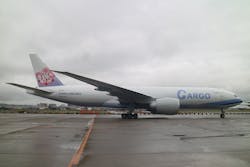SEATTLE - China Airlines unveiled the first of six Boeing 777 Freighters, officially becoming the 20th operator of the world’s largest and longest range twin-aisle freighter. The 777 Freighter joins the airline amid growing demand for dedicated freighters as operators grapple with the impacts from the COVID-19 pandemic.
China Airlines aims to increase its cargo capacity by 15% in 2021 and is planning to launch the 777 Freighter on routes connecting Taipei with North America — a key market with strong demand and escalating yields. An operator of all-Boeing freighter fleet, China Airlines debuted its new 777 Freighter during a ceremony in Taipei to mark the carrier’s 61st anniversary. The airline is set to take five more 777 Freighters as part of an order announced at the 2019 Paris Air Show.
The 777 Freighter is the world’s largest, longest range and most capable twin-engine freighter. The airplane has a range of 9,200 km (4,970 nautical miles) and can carry a maximum payload of 102,010 kg (224,900 lbs). The airplane will allow China Airlines to make fewer stops and reduce associated landing fees on long-haul routes, resulting in the lowest trip cost of any large freighter.
The 747 and 777 freighters, both of which make up China Airlines’ world-class freighter fleet, are capable of carrying tall and outsized cargo loads on 3-meter (10-foot) tall pallets. This common main-deck pallet height capability enables interchangeable pallets, adding to the versatility of both models.
In addition to commercial airplanes, Boeing provides China Airlines with total life cycle support services to streamline parts provisioning and flight and maintenance operations. The entire China Airlines fleet uses Jeppesen FliteDeck Pro, which provides access to digital navigation charts and interactive maps to optimize performance and enhance situational awareness.
China Airlines also recently signed an agreement for Airplane Health Management (AHM), which tracks real-time airplane information, providing data and decision support tools that allow technicians to quickly and correctly resolve maintenance issues. This allows airlines to take proactive actions based on AHM-generated alerts, reducing disruptions to operations and the costs associated with unscheduled maintenance. With the agreement, China Airlines joins more than 100 global customers using the AHM solution.

